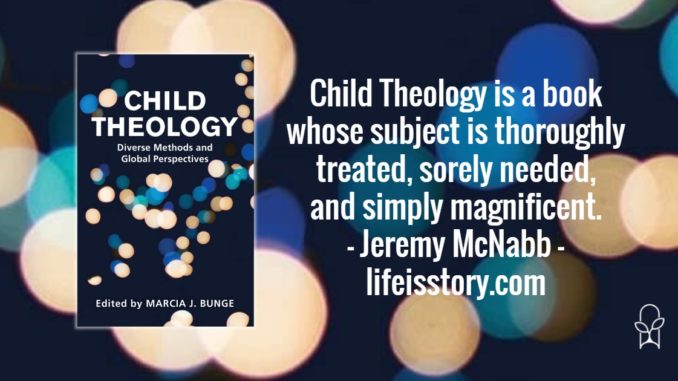
Published by Orbis Books on September 22, 2021
Genres: Academic, Non-Fiction, Theology
Buy on Amazon
Goodreads

Twelve highly respected Roman Catholic, Protestant, and Orthodox theologians from six continents aim to strengthen Christian theology and the church’s commitment to children by rethinking central doctrines and practices with attention to the strengths, vulnerabilities, and full humanity of children.
Like feminist, black, and other liberating forms of theology, child theologies re-evaluate and reinterpret current understandings of Christian faith and life in the light of those who are often voiceless, exploited, or marginalized—in this case children.
Taking diverse approaches and building on a range of sources, including Scripture, tradition, the social sciences, literature, and the experiences of individuals and communities, contributors offer new insights into key theological topics, such as God, creation, theological anthropology, Christology, sin, salvation, the church, mission, and hope.
Introduction by Marcia J. Bunge and Megan Eide. Contributors include Wanda Deifelt (Brazil/USA); Ivone Gebara (Brazil); Rohan P. Gideon (India); Perry T. Hamalis (USA); D. J. Konz (Australia); Valerie Michaelson (Canada); Kenneth Mtata (Zimbabwe); Craig L. Nessan (USA); Agbonkhianmeghe E. Orobator (Kenya/Nigeria); Dirk J. Smit (South Africa); Michael Welker (Germany); Amos Yong (Malaysia/USA).
Liberation Theology gives us tools with which to recontextualize the scriptures in ways that make sense to the hurting. These meanings which emerge from the scriptures under a liberation lens are neither new nor novel, but are often in need of rediscovery. Numerous theologians have tackled the topic of liberation with regards to various marginalized groups: Black, women, queer, etc. Author and professor of religion, Marcia J. Bunge, has assembled an anthology of writings meant to introduce a liberation and humanization of children.
At first, the task seems unnecessary, because people are so quick to share their kids’ stories and photos, and these anecdotes and pictures always seem to draw positive attention. The reality, however, is that a hostility towards children, and a neglect of their autonomy has been slowly growing over the last decade, attention to which has highlighted how cultures all over the world have often ignored the agency and power of children. Child Theology: Diverse Methods and Global Perspectives brings together writers from around the world and from a multitude of denominational backgrounds to talk about how the church has failed children.
The first half of the book has more to do with advocacy for children than theologizing about them, but this sets an important context for the theology that is done later. Bunge and others point out that even among liberation theologians, children tend to be left behind. Whether we’re dealing with the implications of harmful doctrines like original sin, sex scandals in the Catholic church, or the child-like imagination necessary to wrestle with the creation narrative of Genesis, Bunge argues, our perspectives are made broader, fuller, and more representative of the imago dei when we include children.
Advocacy, anthropology, and theology all combine in this carefully curated anthology, moving in a single direction. The Kingdom of God should include children, empowered and humanized to participate in the coming world. This is a text that would make for an excellent in-depth group discussion or even as university literature. The writing is deep but easy going and full of revelation, coming even from the most unlikely of sources. This is a book whose subject is thoroughly treated, sorely needed, and simply magnificent. It is a rare pleasure that I can give a whole-hearted endorsement, but Child Theology is a must-read.
